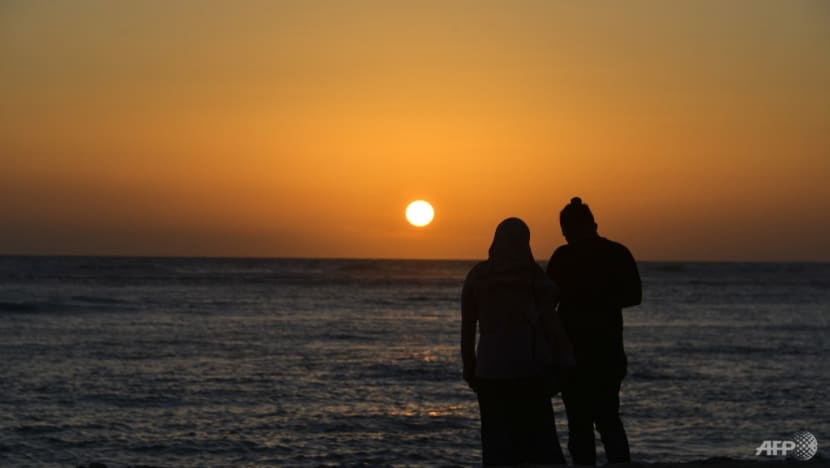Commentary: Criminalising sin? Indonesian society not as conservative as elites imagine
Those who worry that the recent criminal code revision in Indonesia might portend a conservative Islamic tide may take heart in survey findings showing a more tolerant citizenry, says ISEAS-Yusof Ishak Institute's Dr Norshahril Saat.

File photo of a couple is silhouetted against the setting sun. (Photo: AFP/CHAIDEER MAHYUDDIN)
SINGAPORE: Human rights groups in Indonesia and elsewhere have lamented the recent controversial amendments to Indonesia’s criminal code. Amongst other things, the law, as it has been amended, now says that it will be illegal to criticise the president, adding to fears of democratic backsliding under Joko Widodo. But it is the strengthening of so-called "morality laws" that has raised eyebrows.
When the law is implemented, pre-marital sex and cohabitation by unmarried couples will be illegal. Offenders can be jailed up to one year. Controversially, Indonesian parents, children or spouses can report alleged offenders (which includes adulterers and those having sexual relations out of wedlock) to the police.
This has raised tremendous uproar and concern that such provisions will unfairly target domestic LGBTQ communities and individuals, not just unmarried heterosexual couples, and potentially even foreigners and tourists.
It is too early to understand how well these laws will or can be implemented and enforced. Is their passage a sign that Indonesian society is becoming conservative, hence taking the “conservative turn”, as some scholars suggest?
DIFFERENCE BETWEEN SIN AND CRIME
The Indonesia National Survey Project 2022 (INSP) commissioned by the ISEAS-Yusof Ishak Institute gives a more nuanced take.
The world’s three major monotheistic religions agree that sexual intercourse is permitted only between married heterosexual couples. However, the sinner is answerable to the Divine and the act is not a crime in the secular or legal sense.
Indonesians, who live in the largest Islamic nation-state in the world, with significant Catholic, Protestant, and Hindu minorities, can argue that pre-marital sex or adultery are socially or culturally inappropriate acts. Still, over the years, there have been no laws criminalising such “sins”.
Generally, no prior government has tried to interfere in Indonesians’ private lives. In pre-modern Muslim societies, before couples were found guilty of sexual-related offences, the act must have been witnessed by four adults, in accordance with Quranic principles.
Progressive Muslim scholars contend that this condition indirectly means that Islam does not meddle in people’s private lives: There is no way four witnesses can view such acts done behind closed doors. (This is not to say, however, that no such "crimes" have been prosecuted under sharia law in other Islamic jurisdictions.)
There are many traditional understandings indicating that the Prophet Muhammad was not interested in hearing the confessions of couples who had sinned privately.
WHERE IS THE PRESSURE FROM
What is of concern in today’s Indonesia is that all of the political parties unanimously agreed on criminalising these "sins". Did the pressure to do so come from societal conservatism? Broad findings from the INSP show that Indonesians remain moderate, secular, and multicultural in their outlook.
Asked whether Islam is compatible with the state’s ideology, Pancasila, only 13 per cent of respondents disagreed. One of Pancasila’s five principles underscores social justice and unity, which can mean respecting diversity.
A total of 61 per cent of respondents agreed that the government should dissolve Islamic organisations such as Hizbut Tahrir Indonesia (HTI) and the Islamic Defenders’ Front (FPI) if they were deemed “dangerous”. However, 19 per cent did not take a stand. These results can be interpreted as showing that most Indonesians do not tolerate exclusivist groups.
More concerningly, 29 per cent of those surveyed stated that Islam should be the only official religion in Indonesia, even though there are six recognised religions. A total of 35 per cent agreed that Islamic or Sharia laws should be allowed to apply at the local level.
While Indonesia has a Muslim majority, most respondents believe that Indonesia must remain secular. The only contradiction that the survey revealed, possibly demonstrating growing exclusivism for some people, was that more than half of the respondents agreed that when voting for elections, it was important to choose a Muslim leader.
Significantly, 36 per cent of respondents believed that blasphemy against Islam must be punished more severely than blasphemy against other religions. Conservatism is generally stronger among these respondents: The Sundanese, the Minangs, and those in Sumatra, Banten, and some parts of Jakarta.
The survey asks specific questions for Muslims that were skipped for non-Muslim respondents, to measure the former’s religiosity. A total of 93 per cent of the Muslim respondents indicated that they regularly fasted during Ramadan and 80 per cent performed their daily prayers.
However, only 50 per cent of Muslim respondents paid zakat (tithe). While this is one of the five pillars of Islam, this act is mandated only for the wealthy and the middle class.
About 93.1 per cent of those Muslim respondents surveyed have not performed the haj ritual to Mecca. Structural and policy reasons explain this finding: They probably could not afford it and thus it is not obligatory for them to perform the pilgrimage.
They might have also missed the quota imposed by the Saudi Arabian government. In 2022, the Saudi government allowed just 100,000 pilgrims from Indonesia, half of that in pre-COVID times. Interestingly, only 3.2 per cent of Muslims surveyed said they did not intend to perform the haj, which means their religious aspiration is strong even if individuals may not be able to afford the trip.
EXPRESSIONS OF RELIGIOUS IDENTITY
There is certainly a change when it comes to expressions of religious identity. Nearly 70 per cent of Muslim respondents believe that women must put on headscarves (hijab).
This is despite some Indonesian ulama, such as Professor Quraish Shihab, arguing that it is a matter of choice. Only 22 per cent of those Muslims surveyed agree that it is a personal choice. Most of those who believe that wearing the hijab is mandatory are government or senior officials, professionals, and service workers.
A total of 54 per cent of general workers, 63 per cent of trade and craft workers, and 57 per cent of agriculture and fishery workers agreed that the hijab is mandatory for women, compared to 100 per cent of senior officials and 81 per cent of professionals surveyed.
A Muslim believer’s commitment to prayers, fasting, tithe, the haj and for women, wearing a hijab are indicators of personal piety. This however does not necessarily translate into a broader societal Islamic exclusivism in Indonesia.
The shift towards greater personal religiosity also seems to intersect with certain respondents’ higher education or socio-economic profiles and urban residential status. They are more likely to have greater access to the global religious discourse, including that in Europe and United States, where Muslims live as minorities.
Some Indonesian Muslims might be reflecting the habits or outlook of such minority Muslims, who may assert their religious identity in more obvious ways than those living in majority-Muslim states need to do.
The survey results point to the complex relationship between Islam, politics, and society in Indonesia. Indonesians do not necessarily reveal a conservative trend in their religiosity.
Further research on this topic must include conversations with lecturers or scholars in mainstream Indonesian Islamic campuses (especially the state Islamic universities) and Muslim rights activists across the country. Responses from these groups will likely show that most Indonesian Muslims are not as conservative as their politicians think or would like to claim.
Juxtaposing the recent revision to Indonesia’s criminal laws and the seeming tightening of social mores against the survey findings reveals that Indonesia’s elite and politicians might not be reading Muslim ground sentiments closely enough.
It may mean that the current slate of elected politicians are conservative but more likely that they are responding to pressure from some powerful conservative lobby groups. The INSP survey suggests that Indonesia’s Muslims are not as homogeneously conservative as the controversial criminal code now suggests.
Norshahril Saat is Senior Fellow at the ISEAS – Yusof Ishak Institute and Coordinator at the Regional Social and Cultural Studies Programme. This commentary first appeared on the Institute’s blog, Fulcrum.




















